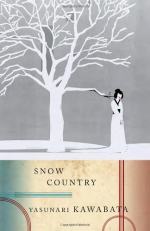|
This section contains 1,431 words (approx. 5 pages at 300 words per page) |

|
[Snow Country] holds the potential to shed considerable light not only on the larger purposes of Kawabata's work but on the techniques of Japanese narrative fiction in general. In this regard, Snow Country is a mirror, reflecting both backwards and forwards….
[Kawabata's Nobel Prize acceptance speech] provided a selection of certain principles especially important to him, many of them related in turn to Zen Buddhism.
The first of these is asymmetry. (p. 162)
Asymmetry and a resulting suggestiveness provide the means by which one small thing can evoke a whole world. Closed structures, harmoniously arranged, merely define themselves. Kawabata is careful to point out, however, that the asymmetry is not naturally evoked but comes from a discipline created through "a balance imposed by delicate sensibilities" that have in turn been rigorously formed and refined. (p. 163)
A desire to pay homage to the nourishment provided by the past seems to...
|
This section contains 1,431 words (approx. 5 pages at 300 words per page) |

|


